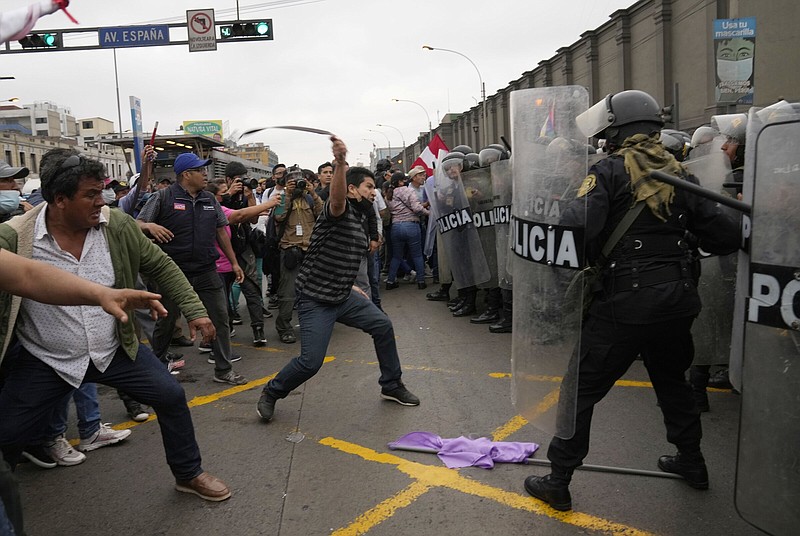LIMA, Peru -- Peru's stunning political crisis ground forward Thursday, as former President Pedro Castillo appeared in court after a failed attempt to close a hostile congress and his successor looked for ways to unite the country behind institutions gutted by endemic corruption and mistrust.
At his initial court appearance, Castillo looked downcast as he gave simple yes or no answers, and his attorney argued that he had been arbitrarily ousted from Peru's presidency on trumped-up charges of rebellion.
The U.S. condemned Castillo's power grab as illegal, and even leftist allies have refused to speak out against his overthrow. A major exception was Mexican President Andres Manuel Lopez Obrador, who called Castillo's removal a "soft coup" fueled by deep-seated racism against the former school teacher from the heavily indigenous Andean highlands.
"It is no longer military intervention," said Lopez Obrador. "It's done with control of the media by the oligarchs, undermining legal and legitimately constituted authorities, especially if they want to do something for the benefit of the long-suffering people who do not belong to the elites."
Meanwhile, Castillo's successor, like many Peruvians, seemed eager to turn the page. In comments to journalists Thursday, Dina Boluarte, who served as Castillo's vice president, appealed for a "truce" from the political feuding that has paralyzed Peru for years so that she can "reorient" the country. With polls showing Peruvians despising Congress even more than they do Castillo, she suggested that she would consider holding early elections -- something that requires approval of a hard-to-muster constitutional amendment.
"I know there are voices indicating early elections and this is democratically respectable," she said.
In just three tumultuous hours Wednesday, Castillo went from decreeing the dissolution of Peru's Congress to being replaced by his vice president. But the threats against his government had been building throughout his nearly 17-month presidency.
The political outsider won a runoff election in June 2021 by just 44,000 votes after campaigning on promises to nationalize Peru's key mining industry and rewrite the constitution, gaining support in rural Peru.
However, once in office, he immediately stepped onto a no-holds-barred political battlefield in Peru, the South American country now on its sixth president in six years. The last one, Francisco Sagasti, had been appointed by Congress just months before Castillo's shocking victory.
But once in office he cycled through dozens of inexperienced Cabinet choices, a number of whom have been accused of wrongdoing. He also faced a hostile Congress, which first tried to impeach him last December. At the time, a relatively small group of opposition lawmakers cited an investigation by prosecutors into illicit financing of the governing party. To remove the president requires two-thirds of the 130 lawmakers to vote in favor. Only 46 voted in favor.
Congress tried to impeach Castillo again in March for "permanent moral incapacity," a term incorporated into Peruvian constitutional law that experts say lacks an objective definition and that Congress has used more than a half dozen times since 2017 to try to remove presidents. The effort failed, this time with only 55 votes in favor.
Each time, Castillo was defiant, arguing he had done nothing wrong.
On Wednesday, Peru was girding for a third impeachment vote. The night before, the president said in an unusual midnight address on state television that a certain sector of Congress had it out for him and that he was paying for mistakes made due to inexperience.
Then shortly before noon Wednesday, Castillo went on state television to announce the dissolution of Congress. He said elections would be held to choose new lawmakers and a new constitution would be written. Various members of his Cabinet resigned immediately and the Supreme Court and Constitutional Tribunal rejected it as an attempted coup.
By nightfall Wednesday, Castillo was being held in the same giant police station housing reviled former President Alberto Fujimori, whose closing of Congress 30 years ago with tanks and soldiers was a far more robust show of force than Castillo's enfeebled moves to temporarily dismiss lawmakers and rule by decree. Despite the high political drama, only small clashes erupted between a handful of Castillo supporters and riot police on guard outside.
